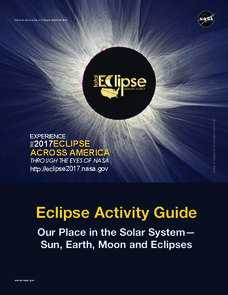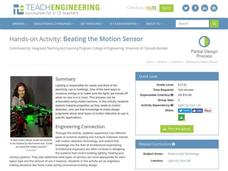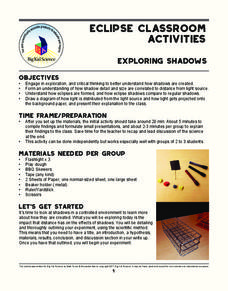Curated OER
Solar Cells
High schoolers are able to answer basic questions about the process of turning light energy into electrical energy. They are introduced to the basic physics and chemistry behind the operation of a solar cell. Students explore how a...
Curated OER
Why is The Sky Blue?
Students explore why the sky is blue. In this light lesson, students conduct an experiment using water, flashlights, and milk to test why the sky is blue. Students view a PowerPoint, take notes on their results and draw conclusions.
Curated OER
Hot Air
Young scholars conduct an experiment to determine how hot air affect the path of laser. In this physics activity, students explain why stars appear to twinkle at night. They discuss how light travels from space to Earth.
Curated OER
Things That Glow: From Fireflies to Quantum Dots
Third graders observe light energy. In this heat and energy lesson, 3rd graders will study the concept of light as a form of energy. Students will examine the different forms of light and the type of energy it produces.
Curated OER
Measuring the Speed of Light
High schoolers explore physics by completing measurement problems in class. In this speed of light lesson, students discuss the importance of knowing the speed of light and how it affects many aspects of human life on Earth. High...
Curated OER
Let There Be Light
Students observe that different lights have different effects on matter. Students see that ultraviolet light is powerful although it cannot be seen through this teacher led demo-experiment.
Curated OER
You, Me and UV
Students explore the validity of claims of UV protection. Students research UV rays and the cancer danger presented by these rays. Working in groups, they perform tests on sunglass and sunscreen products to determine if their claim of UV...
Curated OER
Magic Tree House: Who Turned the Lights On?
In this literature response worksheet, students draw a picture of the Northern Lights. This worksheet is in response to the events in the Magic Tree House book, Who Turned the Lights On?
Exploratorium
Oil Spot Photometer
Are these two light sources the same? Groups use a white card and a little cooking oil to create a photometer that allows for the comparison of two lights. The Inverse Square Law provides a way to calculate the actual difference in...
Discovery Education
Through the Looking Glass
Turning white light into colors only takes a little scientific know how! Young scholars create their own spectroscope in a hands-on activity exploring the properties of light. Using a diffraction grating, they discover how white light...
Urbana School District
Optics
Don't worry, optics is a light topic! The presentation covers reflection, refraction, fiber optics, mirages, prisms, rainbows, dispersion, mirrors, lenses, telescopes, diffraction, the human eye, and much, much more. Presentation is the...
Curated OER
Prism and Light
In this changing light worksheet, 5th graders use crayons to draw what happens to a beam of light when it enters a prism. Students then write the colors of the rainbow for each letter listed.
Teach Engineering
How Effective is Your Sunscreen?
Protect skin from UV radiation! Groups design and conduct an experiment to test the effectiveness of UV safety products. The groups collect the data from the experiment and prepare a lab report. In the second day of the activity,...
American Museum of Natural History
Make Your Own Creatures of Light
Bioluminescent animals are the focus of a hands-on craft in which scholars create a scene of either a land or sea bioluminescent creature.
Lawrence Hall of Science
Photolithography
Examine the use of photolithography in the fabrication of circuit boards and other components. An advanced activity teaches pupils a process for transferring a pattern onto a surface. Using UV light and a light reactive substance,...
NASA
Eclipse Activity Guide
Ever made solar s'mores? Or recreated the solar system using peanuts? Astronomers young and old investigate all things solar using a variety of activities. Explore how the sun works, types of light it emits, and methods of charting the...
Teach Engineering
Electromagnetic Radiation
How can nanoparticles be used in the battle against skin cancer. Class members take on the question as they gather information about electromagnetic radiation, specifically ultraviolet radiation. Pupils learn about the mathematical...
NASA
Supernova Chemistry
By measuring the wavelength, frequency, and intensity of electromagnetic radiation, scientists determine the temperature, density, and composition of far away items. Scholars rotate through ten lab stations using a spectroscope at each...
DiscoverE
First You See It, Then You Hear It
Light and sound go hand in hand. Pupils set up a system that will emit sound when a laser is directed at a photodiode. Various objects, such as a comb and talcum powder, allow for modulation of the laser beam. Individuals also...
National Nanotechnology Infrastructure Network
Jell-O® Waveguide and Power Loss
Jell-O® can help model the transmission of light through fiber optic cables. Young scientists use the jiggly dessert to make a waveguide to transmit a laser beam from one point to another. Their models help them learn the function of...
IOP Institute of Physics
Physics in Concert
What do physicists and musicians have in common? A lot more than you might think. After first viewing a slide show presentation and completing a series of skills practice worksheets on the physics of light, sound, and electricity, young...
NASA
Discovering Some of Your “Yardsticks” Are Actually “Meter-sticks”
The Milky Way gets great reviews on Trip Advisor — 100 million stars. The activity allows scholars to rethink their assumptions and prior knowledge. Pupils observe a set of two lights at equal distance and brightness, but they believe...
Teach Engineering
Beating the Motion Sensor
I bet I can cross the room without having the lights come on. Class members set up an experiment in which they try to determine what materials will mask motion detected by a sensor. Groups predict how materials will interact with light,...
Big Kid Science
Exploring Shadows
What's that lurking in the shadows? An activity that demonstrates how eclipses happen. Science scholars investigate how light and distance interact to form shadows. The experiment uses simple materials to generate data and observations...
Other popular searches
- Light Bulb
- Light and Motion
- Festival of Lights
- Light Energy
- Light Waves
- Light Reflection
- Light Spectrum
- Light and Sound Waves
- Lightning
- Light Sources
- Lightning Rod
- Light and Sound

























